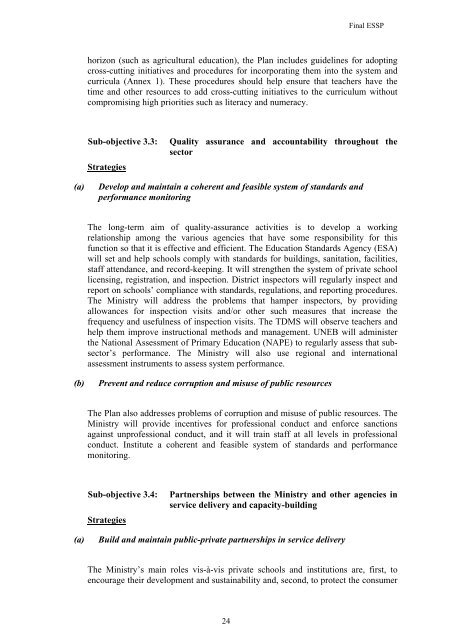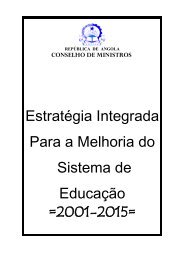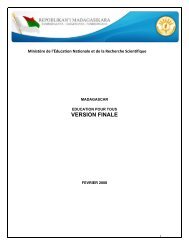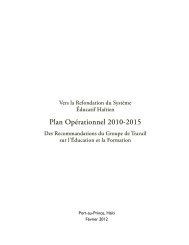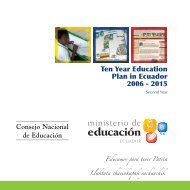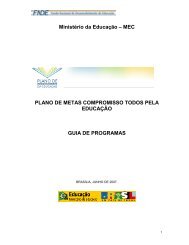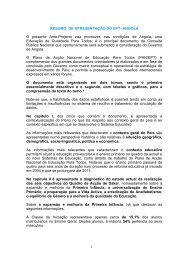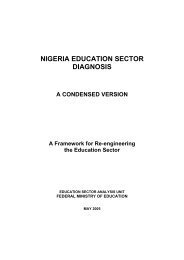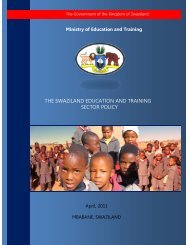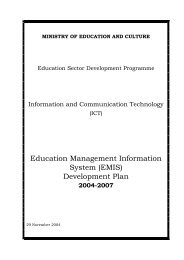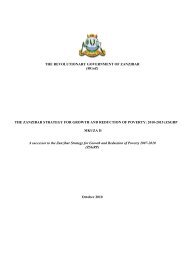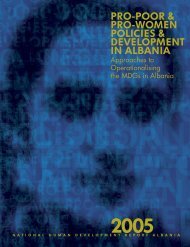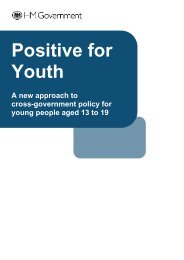Education Sector Strategic Plan 2004-2015 - Planipolis
Education Sector Strategic Plan 2004-2015 - Planipolis
Education Sector Strategic Plan 2004-2015 - Planipolis
Create successful ePaper yourself
Turn your PDF publications into a flip-book with our unique Google optimized e-Paper software.
Final ESSP<br />
horizon (such as agricultural education), the <strong>Plan</strong> includes guidelines for adopting<br />
cross-cutting initiatives and procedures for incorporating them into the system and<br />
curricula (Annex 1). These procedures should help ensure that teachers have the<br />
time and other resources to add cross-cutting initiatives to the curriculum without<br />
compromising high priorities such as literacy and numeracy.<br />
Sub-objective 3.3: Quality assurance and accountability throughout the<br />
sector<br />
Strategies<br />
(a) Develop and maintain a coherent and feasible system of standards and<br />
performance monitoring<br />
The long-term aim of quality-assurance activities is to develop a working<br />
relationship among the various agencies that have some responsibility for this<br />
function so that it is effective and efficient. The <strong>Education</strong> Standards Agency (ESA)<br />
will set and help schools comply with standards for buildings, sanitation, facilities,<br />
staff attendance, and record-keeping. It will strengthen the system of private school<br />
licensing, registration, and inspection. District inspectors will regularly inspect and<br />
report on schools’ compliance with standards, regulations, and reporting procedures.<br />
The Ministry will address the problems that hamper inspectors, by providing<br />
allowances for inspection visits and/or other such measures that increase the<br />
frequency and usefulness of inspection visits. The TDMS will observe teachers and<br />
help them improve instructional methods and management. UNEB will administer<br />
the National Assessment of Primary <strong>Education</strong> (NAPE) to regularly assess that subsector’s<br />
performance. The Ministry will also use regional and international<br />
assessment instruments to assess system performance.<br />
(b) Prevent and reduce corruption and misuse of public resources<br />
The <strong>Plan</strong> also addresses problems of corruption and misuse of public resources. The<br />
Ministry will provide incentives for professional conduct and enforce sanctions<br />
against unprofessional conduct, and it will train staff at all levels in professional<br />
conduct. Institute a coherent and feasible system of standards and performance<br />
monitoring.<br />
Sub-objective 3.4: Partnerships between the Ministry and other agencies in<br />
service delivery and capacity-building<br />
Strategies<br />
(a) Build and maintain public-private partnerships in service delivery<br />
The Ministry’s main roles vis-à-vis private schools and institutions are, first, to<br />
encourage their development and sustainability and, second, to protect the consumer<br />
24


